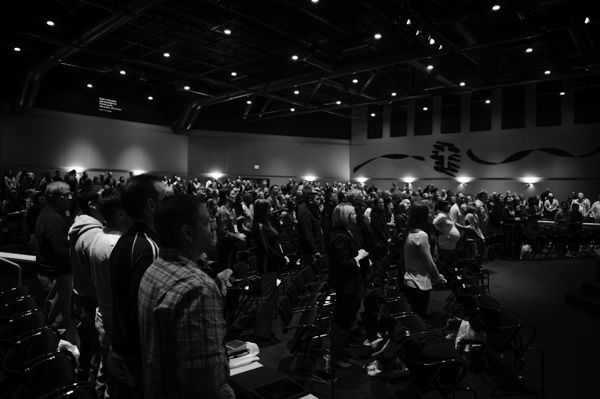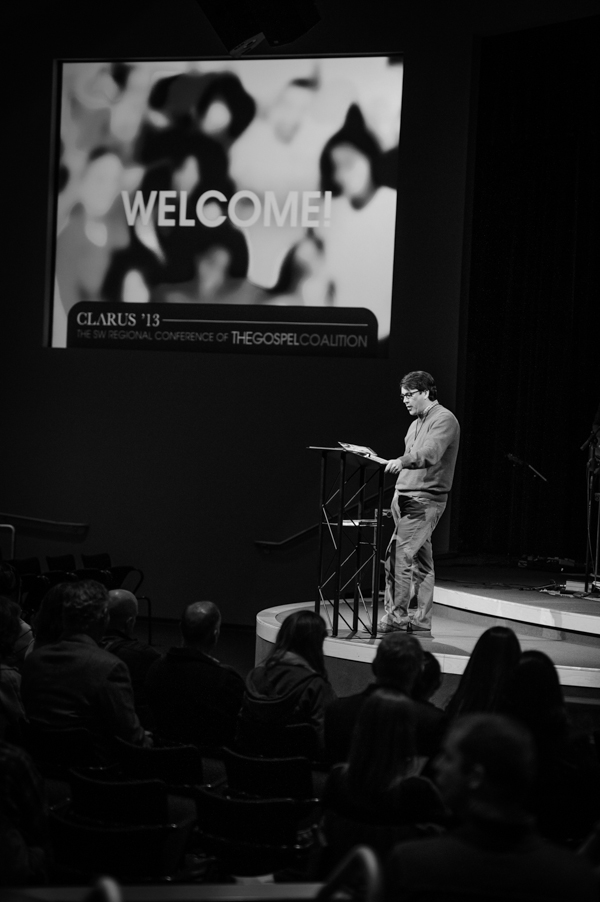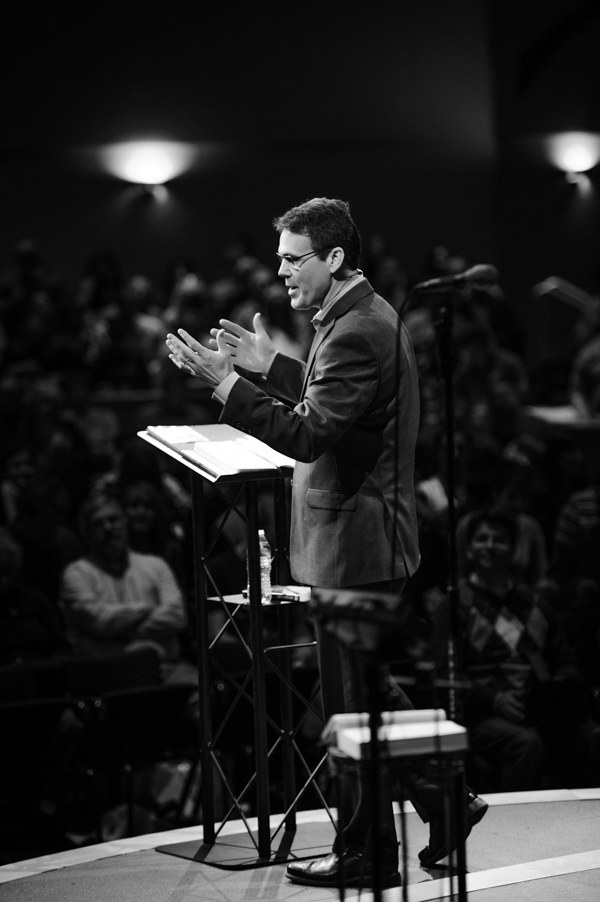Archive for the Clarus 13 Category
Mar 9
Session 6 Recap: Tripp and Lane, Panel Discussion
Editor’s Note: Nathan Sherman is Minister to Youth and Families at Desert Springs Church in Albuquerque, NM. This post is a summary of the Panel Discussion with Paul Tripp and Timothy Lane on Saturday afternoon at Clarus, March 9.
•••••
Following an extraordinary weekend, the Clarus conference enjoyed a panel Question and Answer time with Dr. Lane and Dr. Tripp.
Recapping the conference, Dr. Lane explained that we are really just talking about interpersonal ministry. We aren’t trying to do wacky things and uncomfortably force Jesus into relationships. We are simply talking about a raised-level of shared-life and fellowship.
Dr. Tripp agreed that living in this kind of authentic, gospel-community is the biblical definition of friendship—this is what God calls us to. Typically what we call friendship is not at all what God calls friendship. Our ultimate example is Jesus, a friend of sinners. Dr. Tripp uses this question to diagnose where he puts his energy: What set of values determines how I spend my time? Often the American dream dictates a schedule that gets so busy that we have little time for relationships. This must be challenged.
Question: What’s the relationship of our interpersonal relationships with church?
Dr. Tripp: Preaching is the formative direction of the church. Interpersonal ministry takes this formative direction and adds correction; it takes the general foundation and gives specificity. Church membership is a localized and concrete way that we give ourselves to God’s Kingdom—giving ourselves to the work of the church, while submitting ourselves to the leadership and the ministry of the church. There is a critical difference in attending a church and giving myself to the ministry of the church.
Dr. Lane: The church is where you are brought into covenantal relationships. We commit to a body of believers, whether we like every particular detail or not. The sacraments are fundamental—we are baptized into a body of believers, and we must recognize the horizontal element of the Lord’s Supper – forgiveness and reconciliation with others.
Question: How are the “one-anothers†practically played out within the church?
Dr. Tripp: Everyone in the church (elders, staff, leaders, members) must be able to teach, preach, admonish, and counsel. We call everyone into commitment to these “one-anothersâ€. Then we train our people to do these better. We need to raise the bar for potential gospel-counsel opportunities. We ought to be concerned about those thousands of conversations that happen every week, which will either benefit or harm others. We set life-long trajectories of individuals, families, and churches in these small, daily conversations.
Question: Is it possible to be too introspective and suspicious of ourselves?
Dr. Lane: It is certainly possible of becoming a morbid introspectionist. After we look inward, we must be moved outward toward Christ and his grace, but then outward in new ways toward others. If these outward trajectories are not present, it’s likely you are dangerously introspective.
Dr. Tripp: – In all other human cultures, my well-being is dependent on my performance. But as a Christian, my well-being is not dependent on if I measure up, but that Christ already measured up. If I keep beating myself up, I’m rejecting the sacrifice of Christ. I am essentially back to a works-righteousness religion, and this is dishonoring to God.
Question: Is there a point to end speaking into another’s life when you only receive manipulation and meanness. Is there a point where Proverbs 26:4 (“Do not answer a fool in his follyâ€) applies?
Dr. Tripp: Yes. There must be a point where you must realize you’ve done everything you can do. Once you go past this point, you are taking on God’s job to change the person. You have become a person-mechanic rather than an ambassador of his grace. This doesn’t mean that you give up—you trust the power of Almighty God.
Dr. Lane: Just like parenting teens, wisdom dictates that you pick your spots well. One of the wisest and most godly things you can do as a parent is to keep your mouth closed and not see every moment of your child’s life as an opportunity to interject your opinion.
Mar 9
Session 5 Recap: Lane, “Practicing Forgiveness: What to Do When You Failâ€
Editor’s Note: Tim Bradley is Pastor for Biblical Counseling and Family Ministry at Desert Springs Church in Albuquerque, NM. This post is a summary of Timothy Lane’s message from Saturday afternoon at Clarus, March 9, “Practicing Forgiveness: What to Do When You Fail,†from Matthew 18:21-35.
•••••
In Dr. Timothy Lane’s final message at Clarus 2013, he spoke about the importance of practicing forgiveness in our relationships. He stated that while it is critically important to the health of our relationships, and an essential part of our faith in Christ, it is one of the least practiced things we do. Dr. Lane states, “We think we do it, but we don’t.”
Dr. Lane opened his message by asking, “Is there any hope when we fail?” And then answering with an emphatic “Yes!” he said our hope in the midst of our failures in that we know and embody the grace that we have received in Christ. In other words, it is our knowing the grace and forgiveness of God, and then extending this same grace and forgiveness to others who have sinned against us. This practice of forgiving others, states Dr. Lane, is not something reserved for the extraordinary, unusual and infrequent moments of life only, but rather something that is to be practiced daily.
After introducing us to the subject of practicing forgiveness, Dr. Lane suggests nine important truths from the parable of the Unforgiving Servant (Matthew 18:21-35).
- What exactly is forgiveness? It is not just canceling the debt, but is absorbing the cost of the debt yourself. The Master in the parable absorbs the debt of the first servant. God absorbs our debt as Jesus suffers and dies for our sin, and we practice biblical forgiveness by canceling and absorbing the debt of another when they sin against us.
- Failure to forgive is when we make them pay. The first servant in the parable, who had been forgiven his debt by the Master, requires that the second servant pay the debt he owed. The first servant failed to forgive the second servant, and we fail to forgive when we make others pay for their sins against us rather than showing mercy.
- Forgiveness is an event and an ongoing process. Truly forgiving another is difficult, yet we must forgive as we’ve been forgiven, and keep on forgiving in our hearts, attitudes and actions.
- Failure to forgive turns victims into victimizers. This is clearly seen when the first servant, who was owed a debt by the second servant, fails to forgive, and then literally begins to choke him. We will become victimizers if we fail to forgive.
- Forgiveness is not peace at all costs. Here we back up in Matthew 18 to verse 15, and see that where sin persists, confrontation and discipline is right, God-honoring, and loving.
- Forgiving others is costly. It cost the Master much (ten thousand talents) to forgive the first servant, and it would have cost the first servant much (one hundred denarii) to forgive the second servant. It will cost us much to practice forgiveness.
- Forgiveness is first vertical, and then horizontal. Practicing forgiveness begins with our vertical relationship with God who forgives our sin. Practicing forgiveness continues when those who have been forgiven by God forgive another who has sinned against them.
- Forgiveness is not forgetting. The term “remembering” found in Jeremiah 31:34 is a covenant promise word, not a memory word. God is omniscient, so He doesn’t have any memory malfunctions. God promises to not treat us according to what our sins deserve, and in this sense He “remembers our sins no more.” We are to forgive like God has forgiven us, so we are to make a covenant promise to not treat another according to what they deserve, but we don’t always forget.
- The way we ask for and grant forgiveness is crucial. Simply saying, “I’m sorry” without asking for forgiveness when we have sinned against another diminishes our sin and the other person, and does not glorify God. Saying, “It’s ok” when another person has sinned against you and then apologized tells them it is ok for them to sin. When we sin against another, we need to acknowledge our sin, ask them for forgiveness, and repent. When we are sinned against, and forgiveness is sought, and repentance pursued, then we are to grant forgiveness – make the promises to not use it against them, not talk to others about their sin, and not dwell on it.
Dr. Lane concluded by asking the very practical and important question, “Why don’t we forgive?” He answers first by stating we don’t forgive because we really don’t think we need to be forgiven. We don’t truly know the forgiveness of God, nor believe we need it, and therefore we don’t forgive. Next he says we don’t forgive because we don’t think we’re forgivable. Either in pride, we can’t accept God’s forgiveness, or in shame we don’t remember and receive God’s forgiveness. We essentially forget the grace, love and forgiveness of God, so we fail to forgive others. Finally, Dr. Lane states that we don’t forgive because the utter amazement and shock of the gospel has waned within our hearts. Amazing Grace, is not so amazing to us…we have forgotten. He sums it up by saying, “If you’re not experiencing God’s monsoon of grace, then grace won’t flow out!”
May we be transformed by the amazing grace and forgiveness of God into those who practice the grace and forgiveness we have so richly received!
Mar 9
Session 4 Recap: Tripp, “The Essential Ministry of the Body of Christâ€
Editor’s Note: John Hunt is the Senior Pastor at Covenant of Grace Church in Albuquerque, NM. He is a member of the Albuquerque Chapter of The Gospel Coalition. This post is a summary of Paul Tripp’s message from Saturday morning at Clarus, March 9, “The Essential Ministry of the Body of Christ,†from Colossians 3:12-16.Â
•••••
“If your eyes ever see or ears ever hear the sin, weakness, and failure of the person next to you, it’s never an accident; it’s never an obstacle; and it’s never a hassle. Never, never, never … never. It is always an act God’s grace.â€
If you do see the failures of others in relationships as obstacles or hassles, it is because you fail to see relationships as God sees them. Why are you angry with that person whose sin you have just experienced? Is it because he broke God’s law? More likely, it was because he broke your law. God has put that person in your life—and you in theirs—as an act of grace and as agents of transformation.
From Colossians 3:12-14, Dr. Tripp drew out the truth that, “Your relationships do not belong to you. They are not to be shrunk down to your agenda.†Rather, because God owns that relationship, His agenda is all that matters. We are not merely recipients of His Kingdom, but we are instruments of His Kingdom. Therefore, “Put on Christ. Give others the same grace you have been given.†But you can only give this grace when you see your own deep need for grace. Our problem is not that we are too weak, but rather that we delusionally think we are too strong. We think that we can “fix†people. But we are not people-mechanics. We are ambassadors. For if we could fix people with threats or good advice, Jesus wouldn’t have needed to come and the cross would be unnecessary.
In Colossians 3:15-16, Paul offers some concrete applications for these profound truths. First, he says to let the peace of Christ rule your hearts. You do not need to look to creation for purpose, well-being, fulfillment, or any other need that you already have in Christ. The reason we often fail to live as ambassadors is because we look to other people to do for us that which only God is able to do. The peace of Christ means that Christ has met all my needs. Therefore, I do not need other people to meet my spiritual needs. When I am secure in this identity, I am now able to move outward and focus on others.
Second, let the Word of Christ dwell in you. The Word of Christ is the gospel. Study it; apply it; look through it as your lens for life. The gospel is not merely about forgiveness and going to heaven. Its focus is no just an entrance and an exit. The gospel is also about right now. This “now-ism†of the gospel is the present consideration of every part of life from the perspective of the gospel. “The gospel is the window of everything in life.â€
Third, the apostle commends us to teach and admonish one another. This focus is on every-member ministry. We teach others to see life through the gospel lens through which we are now seeing. We admonish by holding the mirror of the gospel up so that we can see what God wants all of us to see. In this way, all become instruments in the Redeemer’s hands. We live in a broken world of broken relationships, but only the gospel of grace brings healing and restoration. We must commit to one another, seeing our relationships as a means through which God is giving grace and ushering transformation.
Mar 9
Session 3 Recap: Lane, “Godly and Ungodly Conflictâ€
Editor’s Note: John Hunt is the Senior Pastor at Covenant of Grace Church in Albuquerque, NM. He is a member of the Albuquerque Chapter of The Gospel Coalition. This post is a summary of Timothy Lane’s message from Saturday morning at Clarus, March 9, “Godly and Ungodly Conflict,†from Jeremiah 17:5-10 and James 4:1-12.
•••••
Our relationships are in conflict all of the time. We know the biblical steps to reconciliation, but we seldom address conflict relative to the deeper issues of the heart. Dr. Lane showed us that the gospel of grace is the only godly response to conflict.
He first unpacked this by showing the spectrum that Christians tend to fall on in going about change. Moralists focus on behavior; Quietists focus on right thinking; but Covenantalists go beyond both behavior and right thinking. Christians are in covenant with God and can rely upon his promise of grace to help in all times.
Turning to James 4:1-12, Dr. Lane explained that you will encounter conflict. You can either respond in a godly or ungodly manner. James identifies the root of conflict to be internal desires rather than external circumstances (James 4:1-3). These desires (which may not be evil, in and of themselves) then increasingly progress into demands, needs, expectations, and disappointments. When we don’t get our desires met, we then punish others for not meeting our desires. Our unmet desires are the root of all conflict!
Do you then pray? Yes? No? Maybe? James points out that even when you pray, your prayers are too often rooted in selfishness. So we often wrongly pray for God to change the other person, while entirely ignoring ourselves.
Dr. Lane showed that this selfish and ungodly response must be deconstructed and then reconstructed. James directs our attention to the gospel of grace (James 4:4-10). By addressing his church negatively, James implies what they are and should be. In using the word “adulterousâ€, James is reminding them of their fundamental identity as the covenant bride of Christ. Even in the moment of sin, James reminds them that the Holy Spirit is jealously and zealously pursuing them. This is GRACE! And, incredibly, when we humble ourselves before him, he then pours out MORE grace.
The result of God’s grace is deep repentance. Now genuine change can begin to take place. Conflict is resolved, not by external behavior, but by internal transformation.
When I am confronted in conflict, the godly response then is to understand myself (James 1-3); understand the gospel with the accompanying intellectual faith and repentance (James 4-6); understand the other person (1 Peter 3:7-8); and then to seek to serve (1 Thessalonians 5:14). In all of this I must remember that Christ has justified me; therefore I have been received. Christ has sanctified me; therefore I need not sin. And because I belong to Christ’s kingdom, I don’t need to build my own kingdom (1 Corinthians 1:30).
In order for our horizontal relationships with others to be transformed and reoriented, our vertical relationship with God must first be transformed and reoriented — but only in that order.

















